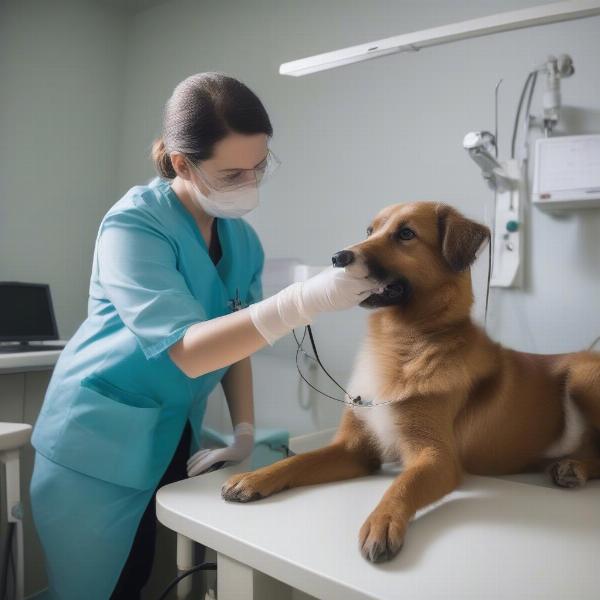Sudden vision loss in dogs can be a terrifying experience for both the pet and the owner. It can manifest in various ways, from bumping into furniture to a complete inability to navigate. Understanding the potential causes, symptoms, diagnosis, and treatment options is crucial for providing the best possible care for your furry friend. This guide will provide you with a comprehensive overview of sudden vision loss in dogs, equipping you with the knowledge to navigate this challenging situation.
Sudden blindness in dogs can stem from a variety of underlying issues, ranging from infections to trauma. Recognizing the signs early on can significantly impact your dog’s prognosis. Some common symptoms include disorientation, hesitancy to move, dilated pupils, cloudy eyes, and apparent confusion. If your dog displays any of these signs, it’s imperative to seek veterinary attention immediately.
Identifying the Causes of Sudden Blindness in Dogs
Several factors can contribute to sudden vision loss in dogs. These include:
- Sudden Acquired Retinal Degeneration Syndrome (SARDS): This condition, often affecting middle-aged dogs, results in rapid degeneration of the retina.
- Glaucoma: Increased pressure within the eye can damage the optic nerve, leading to vision loss.
- Cataracts: While cataracts typically develop gradually, they can sometimes cause rapid vision impairment, especially if they mature quickly.
- Trauma: Injuries to the eye or head can directly impact vision.
- Infections: Certain infections, such as uveitis or optic neuritis, can cause inflammation and subsequent vision loss.
- Diabetes: Diabetic retinopathy, a complication of diabetes, can affect the blood vessels in the retina, leading to vision impairment.
- Hypertension: High blood pressure can damage the blood vessels in the eyes, impacting vision.
Diagnosing Sudden Vision Loss in Dogs
Your veterinarian will conduct a thorough examination, including a detailed eye exam, to determine the underlying cause of your dog’s vision loss. They may also perform additional tests such as blood work, ultrasound, and electroretinography (ERG) to assess retinal function. Accurate diagnosis is critical for developing an appropriate treatment plan.
What tests can a vet perform to diagnose sudden blindness? A variety of tests, from basic eye exams to specialized imaging like ERG, can help pinpoint the cause.
Treatment Options for Canine Vision Loss
Treatment options will vary depending on the underlying cause of the vision loss. In some cases, such as with cataracts, surgery may be an option to restore vision. For conditions like SARDS or glaucoma, treatment may focus on managing the condition and providing supportive care to improve your dog’s quality of life.
“Early diagnosis and intervention are key to managing sudden vision loss in dogs,” says Dr. Emily Carter, a veterinary ophthalmologist. “While not all causes are reversible, appropriate treatment can often slow progression and improve the dog’s comfort.”
 Veterinarian examining a dog's eye
Veterinarian examining a dog's eye
Helping Your Blind Dog Adjust
If your dog’s vision loss is irreversible, there are ways to help them adapt to their new reality. Creating a safe and predictable environment is essential. Avoid rearranging furniture and keep pathways clear. You can also use scent markers to help your dog navigate their surroundings. Interactive toys and games can provide mental stimulation and enrichment.
How can I make my home safer for a blind dog? Keep pathways clear, avoid rearranging furniture, and use scent markers to help your dog navigate.
Conclusion
Sudden vision loss in dogs can be a daunting challenge, but with prompt veterinary care and a supportive environment, your dog can still live a happy and fulfilling life. Understanding the causes, symptoms, and treatment options is the first step in providing the best possible care for your beloved companion. Remember, early intervention is crucial.
FAQ
- What are the first signs of vision loss in dogs? Early signs can include bumping into objects, disorientation, hesitancy to move, and changes in pupil size.
- Is sudden blindness in dogs always permanent? Not always. Some causes, such as cataracts, can be treated with surgery. However, other conditions like SARDS may result in permanent vision loss.
- How can I help my blind dog adjust to their new environment? Create a safe and predictable environment, avoid rearranging furniture, use scent markers, and provide interactive toys for mental stimulation.
- What is SARDS in dogs? SARDS, or Sudden Acquired Retinal Degeneration Syndrome, is a condition that causes rapid degeneration of the retina, leading to sudden blindness.
- What are the treatment options for glaucoma in dogs? Treatment options for glaucoma aim to reduce eye pressure and manage pain. Options may include medications, surgery, or in severe cases, eye removal.
- Can diabetes cause blindness in dogs? Yes, diabetic retinopathy, a complication of diabetes, can damage the blood vessels in the retina and lead to vision impairment.
- How much does it cost to treat sudden blindness in dogs? The cost of treatment varies depending on the underlying cause and the required procedures. Consult your veterinarian for a specific estimate.
ILM Dog is your trusted resource for all things dog-related. We offer expert advice on dog breeds, health, training, nutrition, grooming, and much more. Our mission is to empower dog owners with the knowledge and resources they need to provide the best possible care for their furry friends. For any questions or further assistance, please contact us via email at [email protected] or phone at +44 20-3965-8624. ILM Dog is here to support you and your canine companion on every step of your journey together.